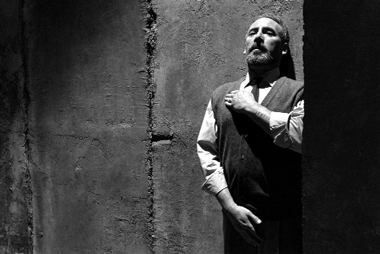Antony Sher’s “Primo” graces Broadway with a compelling look at one man’s descent to hell at Auschwitz
Sir Antony Sher is one of those actors I would pay to hear read the phone book. I have seen him do low comedy and high drama on the London stage with equally dazzling results. As Prime Minister Benjamin Disraeli in “Mrs. Brown” and the bard’s therapist in “Shakespeare in Love,” he reminded us that there are no small roles, only small actors. His portrayal of a conflicted social worker in love with a handsome ballet dancer with AIDS in “Alive and Kicking” brought many of the real emotions of the epidemic to film. But his performance in “Primo” on Broadway is in such a class by itself that I felt genuinely privileged to have been in the theater with him.
If you haven’t bought your ticket for it, do so immediately. After August 7, it will never be performed again anywhere—by Sir Antony or anyone else.
“Primo” is Sher’s distillation of Italian Holocaust survivor Primo Levi’s memoir, “Survival in Auschwitz.” It is storytelling that both strips the harrowing experience of being thrust into Auschwitz at age 24 of sentiment and helps us understand the meaning of the term “extermination camp” step by dehumanizing step. When he hears an old fellow inmate pray in thanksgiving for not being chosen to die that day amidst men they know will meet their doom, he tells us, “If I was God, I would spit at Kuhn’s prayer!”
We’ve all seen footage from the death camps—the emaciated and broken survivors, the piles of dead bodies virtually unrecognizable as human. Hollywood has been trying to convey the Nazi atrocities from “The Seventh Cross” with Spencer Tracy during the war itself to Stephen Spielberg’s “Schindler’s List.”
Director Claude Lanzmann of France came closest to putting the true experience of living through Hitler’s final solution in his 10-hour documentary “Shoah,” which relied solely on the testimony of eyewitnesses—survivors, perpetrators, and not-so-innocent bystanders, but no archival footage. It was this approach that gave Sher the inspiration to adapt Levi’s story for the stage. He has crafted an hour and a half of theater that goes “Shoah” one better by guiding us through just one man’s descent into hell, helping us to feel not just his shock and pain and terror, but his surprise and disbelief and rare—extremely rare—moments of relief and human connection.
This is awfully tough stuff, but please don’t think that going to “Primo” amounts to taking your medicine. Sher has constructed a quietly gripping play—serious to be sure, but profoundly compelling as well. There is also enough irony and even humor to keep us off balance and curious about what Levi will tell us next. Consider the opening line: “It was my good fortune to be deported to Auschwitz only in 1944.” What could he possibly mean? You won’t stop listening for a moment.
Director Richard Wilson and his creative team have placed Sher amidst bare walls and just enough light and movement to help us focus on the narrative and his embodiment of Levi, casually dressed and recounting his experiences from middle age.
Sher had difficulty obtaining permission from Levi’s estate to perform his adaptation. When they agreed, permission was limited to him alone doing the role. He has presented it at the National Theater in London, in his native South Africa, and finally in New York. His outsider status as a gay man and a white South African have no doubt informed his work.
The audience in the Music Box Theatre the evening I saw “Primo” was overwhelmingly older and predominately Jewish. I was accompanied by a 64-year-old friend whose mother and father, a Jewish couple, fled Berlin in 1938 and who each lost a brother as well as other relatives in the camps. These people have a special investment in the world not forgetting the Holocaust and seeing to it that nothing like it happens again. But so do we all.
The fires of the Holocaust were never completely extinguished and continue to burn in both immense and small ways from Rwanda to Darfu to the AIDS pandemic to Iraq to the Underground tunnels of London—all hate-driven death. I wish that “Primo” could be seen by a theater full of high school students or members of Congress or unsuspecting Red State tourists who mistook it for the latest hit musical. That may not happen in its limited run, but we have the chance to grace our lives with “Primo” and to let its unsettling alchemy work on us.
All actors work hard and deserve some measure of applause. Sher also deserves our thanks for putting himself through “Primo” every night and bringing Primo Levi to life.
gaycitynews.com


































